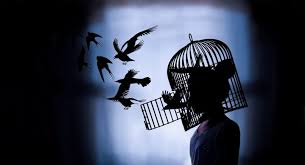
"Memory is fragile and the space of a single life is brief, passing so quickly that we never get a chance to see the relationship between events; we cannot gauge the consequences of our acts, and we believe in the fiction of past, present, and future, but it may also be true that everything happens simultaneously." Isabel Allende

Have you recently handled a dying patient? Are you currently handling a dying patient? How do you feel about it? A few months ago I had to take a video of a dying patient for his family as a final request. He had flown into the country as a tourist but unfortunately, he got critically ill. He had traveled unaccompanied and tracing his family was quite arduous. His condition gravely worsened to a point where he was on treatment failure. When his family was finally traced and contacted it was almost too late. To help them cope with this situation his father requested a video. He could not bear seeing his son who has been physically fit in such a state. He was also buying time as he tried to figure out a way to disclose this information to the rest of his family back in their homeland. He was too heartbroken to physically see him and I felt for him. Imagine being in his situation. How strong are you to handle such events? These words sound familiar, right? Well, I have written them before in a blog post titled
Inside voices please part 1. I did not abandon the conversation I just needed an appropriate time and this is it.

In healthcare like in any profession, it gets to a point where some things become mundane then there are other activities that you just cant acclimatize yourself with. You may be physically okay but for a briefly these moments remind you of your mortality or the mortality of your loved ones. I hope at least one person who reads this today learns from it or realizes that they are not alone. Do you remember the patient I mentioned at the start of today's post well he died the same day I took the video. For a while, I thought I was handling it appropriately. It was not my first death and surely not my last so nothing really stuck out except for this feeling of anticipatory grief that had started a few days before his death. After a few days, it turned out I was not coping well. I found myself being too emotional, whilst alone I would cry at the most inappropriate things, I wished to be alone despite my friends wanting to spend time with me, most of my anger was unwarranted, I was hyperventilating on some days and I had nightmares so I couldn't sleep adequately. This may not come off clearly here for its just a snapshot of an extensive timeline so bear with me. I finally knew something was off when I realized I hadn't shown up for work. On this day I woke up, showered, got dressed, tried opening the door but I couldn't. I had an overwhelming feeling of anxiety so I decided to switch off my phone and went back to bed. About an hour later, I woke up took a public service vehicle, and went to a spot where I often go to meditate. For most of that day, I was unreachable. On that day I just did not understand what was happening.

Later on that day I learned that some of my colleagues and friends had been looking for me and when my best friend showed up that's when I established the root of my problem. All this had resulted from the loss of my patient. It turned out that I had not addressed it adequately. She allowed me to vent, cry, curse out and she didn't leave till I felt better. This was the catharsis I had needed all along. I had a lot more to do thereafter, and I did. This situation reiterated the fact that no matter how used to death you think you are. There will be days that are tougher than others and it is okay.

Globally Covid 19 infectivity is at an approximated 12million people and approximately 500,000deaths why I state approximately is because by the time I publish this post the figure will have changed. View current data here
W.H.O data link. Current research is showing that Covid 19 mortality rate increases mainly with age extremities and having a history of an underlying medical condition. One such study is a
predictor of mortality Please review it for a greater understanding. With a vast majority of our population having non-communicable diseases it means that more health workers will soon be experiencing the same things as I if not worse. Are we prepared? I chose to share findings from a study done in China because it being an epicenter I believe it gives a good example of the magnitude of the problem. The researchers who conducted this study were aiming to examine the impact of working among populations greatly affected by the Covid19 pandemic. Their results show that a large proportion of the participants had symptoms of depression "(634 [50.4%]), anxiety (560[44.6%]), insomnia (427 [34.0%]), and distress (899 [71.5%]). Nurses, women, frontline workers, and those in Wuhan reported experiencing more severe symptom levels of depression, anxiety, insomnia, and distress". I highly recommend that you read it
mental health outcomes

Borrowing from personal experience we can try to cope with these feelings by;
1. Utilizing availed resources-Currently, most organizations and facilities have established mental wellness programs for health workers. If your facility has not, try and see how you can help in establishing them. It can be as simple as taking five minutes each day as a team to share a few things you are grateful for at the start of each shift.
2. Stop criticizing each other when you realize someone can't cope with what you can. We are all unique and different.
3. Consider utilizing our untapped skills. Maybe among us are great optimistic leaders who can offer some form of reassurance when we feel overwhelmed.
4. Take care of yourself more intentionally. When its time to rest guard that time preciously. We cope better with difficult scenarios when rested.
5. Open discussions with our different support systems. Let them know beforehand that the journey at times is really difficult and sometimes all you need it time, patience, and love.
6. Be open about what you are going through.
7. To the leaders, supervisors, managers the roles may be different but do not judge nor be quick to dismiss. Be more empathetic to your staff. Ask them "how can we help rather than why did you do that? "It encourages effective communication.

Despite how today or tomorrow is, just know it does get better. We have successfully weathered out other pandemics as professionals and we shall get through this too. "Courage doesn't always roar. Sometimes courage is the quiet voice at the end of the day saying 'I will try again tomorrow."Mary Anne Radmacher
Wonderfully written
ReplyDeleteIts always a sad moment when a patient dies..
ReplyDelete